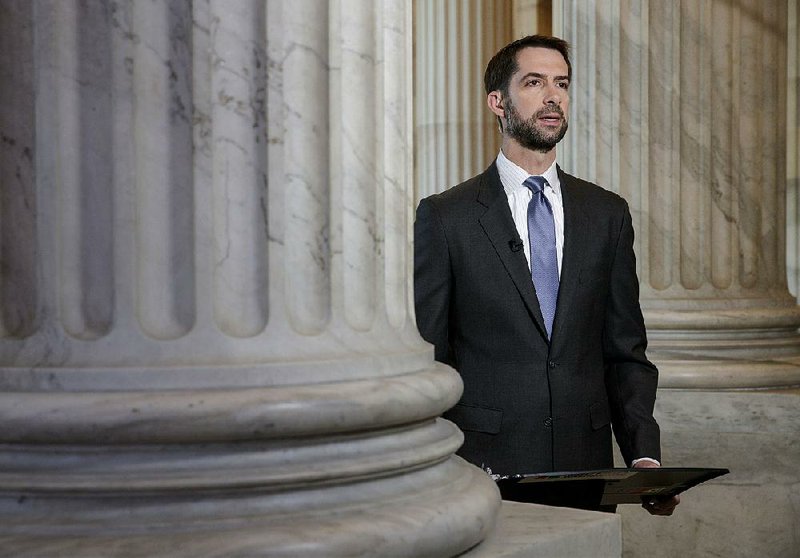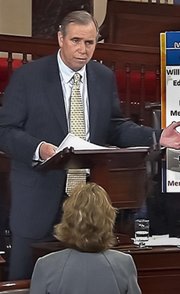WASHINGTON -- Senate Democrats elevated their attacks against President Donald Trump's Supreme Court nominee Wednesday, portraying him as an ally of the powerful and an enemy of the weak as a showdown loomed on the Senate floor. Republicans defended Judge Neil Gorsuch, accusing Democrats of trying to block him out of frustration over Trump's election victory.
"Democrats are bowing to hard-left special interests that can't get over the results of the election and thus are demanding complete Democratic opposition to everything this president touches," said Majority Leader Mitch McConnell, R-Ky. "There is simply no principled reason to oppose this exceptional, exceptional Supreme Court nominee."
Democrats begged to differ, returning again and again to McConnell's decision last year to deny consideration to then-President Barack Obama's Supreme Court nominee, Judge Merrick Garland, who was ignored for nearly a year by Senate Republicans after the death of Justice Antonin Scalia.
"For the first time in history, we are considering a nominee for a stolen Supreme Court seat, and that alone should be reason for everyone who cares about this institution to turn down this nominee," Sen. Jeff Merkley, D-Ore., said on the Senate floor as he wrapped up a 15½-hour overnight talk-a-thon to underscore his party's opposition to Gorsuch. "To proceed to fill this stolen seat will damage the court for decades to come."
[U.S. SUPREME COURT: More on Gorsuch, current justices, voting relationships]
First, though, looms showdown votes today, when 44 Democrats and independents intend to try to block Gorsuch by denying Republicans the 60 votes needed to proceed to final passage. McConnell and Republicans intend to respond by unilaterally changing Senate rules to remove the 60-vote filibuster requirement for Gorsuch and all future Supreme Court nominees, reducing it to a simple majority in the 100-member Senate.
Doing away with the 60-vote barrier would eliminate the minority party's historic influence over who the president nominates to the high court and significantly decrease its ability to help exercise a check on the executive branch.
Moderate Republican Sen. Susan Collins of Maine said roughly 10 senators of both parties worked over the weekend to come up with a deal to stave off the "nuclear option," as the rules change is known, but couldn't come to agreement. Sen. Chris Coons of Delaware was at the center of talks on the Democratic side.
In 2005, a bipartisan deal headed off GOP plans to remove the filibuster barrier for lower-court nominees, although in 2013 Democrats took the step after Republicans stonewalled President Barack Obama's federal judgeship appointments, leaving the filibuster in place only for Supreme Court justices.
With Trump in the White House and political polarization at an extreme, senators working toward a compromise did not appear to have much support from leadership and weren't able to finalize a deal.
"We just couldn't get there," Collins said.
Fear regret ahead
With the fight over Gorsuch, the Senate is on the verge of killing off the Supreme Court filibuster, the one remaining vestige of bipartisanship on presidential appointments. For now the filibuster barrier on legislation will remain, though many fear it could be the next to go.
"I fear that someday we will regret what we are about to do. In fact, I am confident we will," said Sen. John McCain, R-Ariz. "It is imperative we have a functioning Senate where the rights of the minority are protected regardless of which party is in power at the time."
Nonetheless, McCain was prepared to vote with McConnell on the rules change, saying he felt he had no choice.
Gorsuch now counts 55 supporters in the Senate: the 52 Republicans, along with three moderate Democrats from states that Trump won in November -- Joe Manchin of West Virginia, Heidi Heitkamp of North Dakota and Joe Donnelly of Indiana. A fourth Senate Democrat, Michael Bennet from Gorsuch's home state of Colorado, has said he will not join in the filibuster against Gorsuch but has not said how he will vote on confirmation.
Merkley's lengthy speech, while not technically a filibuster because it did not prevent or delay a planned vote, was the eighth-longest floor speech in Senate history at 15 hours and 27 minutes, according to the Senate historical office.
At 10:15 a.m., Merkley wrapped up, left the floor, and got coffee and bagels for the Senate staff members who stayed up working as he was speaking. Turning to a group of reporters, he reiterated his hope that Republicans and Democrats could cut a deal, such as waiting until another seat opened on the court, so that Gorsuch could be nominated alongside Garland.
"I hope that somehow, the message will reach a few hearts across the aisle, that we're on a path that we have not yet completed," said Merkley. "The seat has not yet been stolen."
Asked if he regretted his 2013 advocacy to limit the filibuster for offices lower than the Supreme Court, Merkley stood his ground. Presidents, he said, deserved to pick their staff. And Democrats had spent months trying to find a way around the "nuclear option," until deciding that Republicans were never going to budge.
"We labored for the better part of a year, working with our Republican colleagues. It wasn't like what's going on now," he said. He snapped his fingers. "Just like that."
Boozman and Cotton
Democrats and Republicans have delivered sharply contrasting speeches on Gorsuch this week. Democrats have repeatedly brought up Garland and portrayed Gorsuch as beholden to wealthy corporate interests as opposed to average Americans. They also have expressed concern about confirming Trump's nominee at a time when ties between his team and Russia have come under heavy scrutiny.
Republicans have portrayed Gorsuch as a more-than-qualified and mainstream judge with sterling career credentials. They have argued that Democrats would block anyone Trump puts up.
Sen. John Boozman, R-Ark., said opposition is "purely partisan" and accused Democrats of siding with "outside, far-left activist groups" to derail an exemplary nominee.
"Judge Gorsuch is eminently qualified. ... His credentials are exceptional. His resume is impressive," Boozman said. "Judge Gorsuch is about as mainstream as you are going to find."
Boozman said efforts to stop the Supreme Court nominee would fail.
"Judge Gorsuch will be confirmed to the Supreme Court this week. It is unfortunate that we may have to break long-standing precedent to do so, but Senate Democrats' actions are to blame for that," he said.
Sen. Tom Cotton, R-Ark., also has predicted that Gorsuch will be confirmed.
"To my knowledge, no senator genuinely disputes his eminent qualifications, his judicial temperament, and his outstanding record over the last decade on the 10th Circuit Court of Appeals," Cotton said Tuesday.
He blamed the "radical Democratic minority" and "extremists in the Democratic caucus" for this week's standoff, saying "if Democrats will filibuster Neil Gorsuch, then they will filibuster any Republican nominee."
Cotton said he had no problem carrying out the nuclear option.
"I'm not regretful. I'm not wracked with guilt. I'm not anguished. I'm really not even disappointed," he said. "The radical Democrats brought this all on themselves and on the Senate. The responsibility rests solely and squarely on their shoulders," he said.
Asked Tuesday if he is confident that he has the votes to make that change, McConnell replied simply: "Yes."
Information for this article was contributed by Erica Werner, Mark Sherman, Mary Clare Jalonick and Jill Colvin of The Associated Press; by Sean Sullivan and David Weigel of The Washington Post; and by Frank E. Lockwood of the Arkansas Democrat-Gazette.
A Section on 04/06/2017

